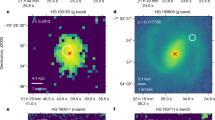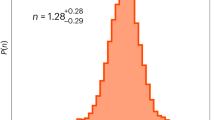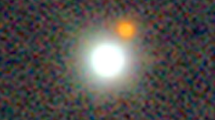Abstract
Bias in the counting of quasars can arise partly from the scatter of intrinsic brightness and partly because of the shapes of quasar spectra. The corresponding selection effects can be eliminated for any cosmological model assumed. This procedure will be important for the evaluation of future catalogues of radio sources. At present, no decision can be made, from a statistical count of quasars, between steady state and other cosmological models.
This is a preview of subscription content, access via your institution
Access options
Subscribe to this journal
Receive 51 print issues and online access
$199.00 per year
only $3.90 per issue
Buy this article
- Purchase on Springer Link
- Instant access to full article PDF
Prices may be subject to local taxes which are calculated during checkout
Similar content being viewed by others
References
Veron, P., Nature, 211, 724 (1966).
Hoyle, F., and Burbidge, G. R., Nature, 210, 1346 (1966).
Roeder, R. C., and Mitchell, G. F., Nature, 212, 165 (1966).
Pauliny-Toth, I. I. K., Wade, C. M., and Heeschen, D. S., Astrophys. J. Supplement Series, XIII, No. 116, 65 (1966).
Sciama, D. W., and Rees, M. J., Nature, 211, 1283 (1966).
Author information
Authors and Affiliations
Rights and permissions
About this article
Cite this article
KAFKA, P. How to count Quasars. Nature 213, 346–350 (1967). https://doi.org/10.1038/213346a0
Issue Date:
DOI: https://doi.org/10.1038/213346a0
This article is cited by
-
Shedding light on the galaxy luminosity function
The Astronomy and Astrophysics Review (2011)
-
Luminosity function of Seyfert galaxies
Astrophysics (1980)
-
Source number as a function of the flux and the V/Vm method in the investigation of the evolution of quasistellar radio sources
Astrophysics (1975)
-
Bulletin GRG, No. 25: List of publications
General Relativity and Gravitation (1971)
-
Local Theory for Quasars
Nature (1969)
Comments
By submitting a comment you agree to abide by our Terms and Community Guidelines. If you find something abusive or that does not comply with our terms or guidelines please flag it as inappropriate.



